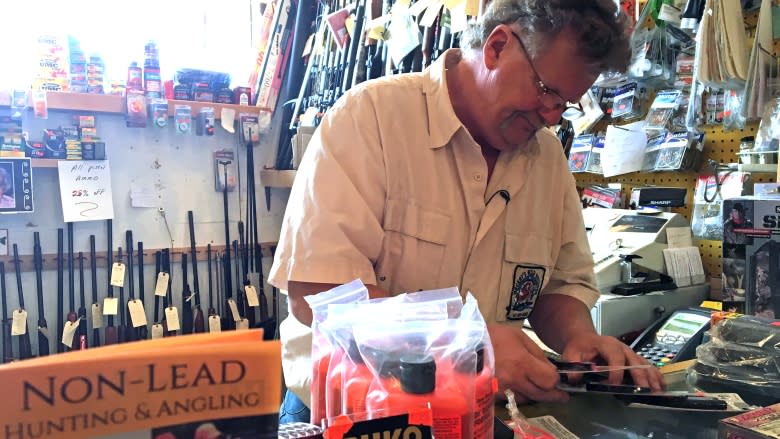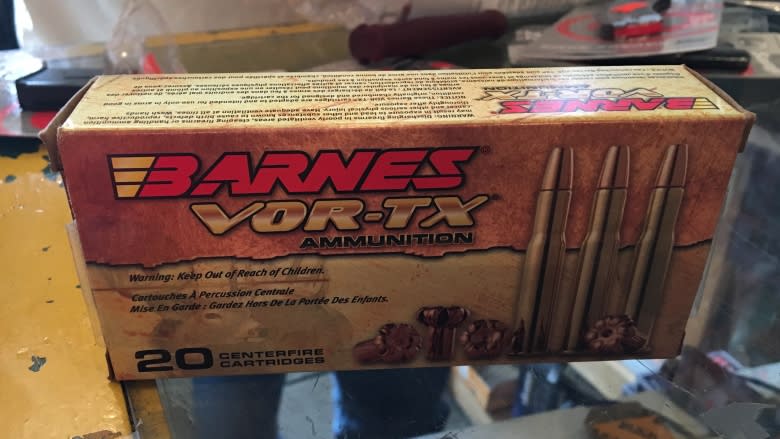Hunters say non-toxic ammo hard to find as 7th lead-poisoned eagle found
Hunters say it is too difficult to get their hands on non-toxic ammunition in Nova Scotia, even with the push to move away from the lead rounds whose fragments can poison eagles scavenging on the remains of shot animals.
There are renewed concerns about birds ingesting lead as the Cobequid Wildlife Rehabilitation Centre near Truro, N.S., deals with its seventh poisoned eagle case this year.
"It's quite frustrating because I know as long as there is lead out there, it's going to keep happening," said Helene Van Doninck, a veterinarian at the facility.
"I'm trying to remain positive about it, because we are actively trying to get the information out to the hunting and angling community about lead."
Hard to find non-lead ammo
Several hunters who spoke to CBC News are sympathetic to the problem but say a major issue is the availability and variety of non-lead bullets.
Ian Avery is president of the Federation of Anglers and Hunters in Nova Scotia, which promotes using non-toxic bullets and tackle. He said the ammunition is difficult to find.
"You'd be hard-pressed to walk into a department store today and put your hand on a box of non-lead ammunition," he said.
Some hunters are even urging the government to ban lead ammunition, however a spokesman for the Department of Natural Resources says there are no plans to do so.
Dave MacKay, owner of Wild Outdoor Adventures in Truro, said getting a consistent supply from manufacturers of non-lead bullets on his shelves in a calibre his customers are looking for is difficult.
"You can go a year at a time and never find a box of it," he said, adding hunters will then stick to the lead bullets they're familiar with.
"People aren't doing this maliciously, they just don't know any better," he said. "It's a sin because when [the rehab centre] first told me, it floored me."
Non-lead ammo not well advertised
MacKay and Avery both said the non-lead packages don't advertise that fact.
"You need to know what you're looking for, you need to know the brand and what it's called. There is no major advertising campaign on the go right now," said Avery.
Avery said the booklet given to every Nova Scotia hunter when they sign up for a licence has a section recommending non-lead ammunition.
Tiny fragment can kill an eagle
Lead ammunition fragments when it hits its target. Many hunters, after they chop up the carcass, will return the remains to nature.
Other animals feasting on those remains, however, can ingest the lead and be poisoned. Symptoms of lead poisoning include weakness, and the inability to walk, stand or fly.
The number of lead-poisoned birds that arrive at the Cobequid centre varies from year to year. Van Doninck pointed to one estimate that 25 per cent of eagles brought to rehab centres in North America have serious lead poisoning.
Van Doninck said most hunters switch once they learn about the dangers of lead bullets, and she hopes hunters and anglers spread the word among themselves. She also suspects she sees only a small percentage of the poisoned animals.
"Eagles don't go knocking on someone's door when they're not feeling well. The response of any wild creature when it feels ill is to hide so it's not susceptible to predation," she said.
Non-toxic ammo costs more
Hunters who still use lead ammo can help by burying the entrails of game so scavengers can't eat it.
Non-lead ammunition — most commonly made of copper or copper alloy — is more expensive than lead ammunition. MacKay said the cheapest box of lead ammo costs about $30. A higher-quality lead ammunition in a fragment-reducing jacket might cost about $50, while a box of copper ammunition costs about $60 or $70.
MacKay said copper is "faster and more efficient in the air," but admits it's different and can take practice to adjust to using — practice that would require and reliable supply of non-lead bullets.
MacKay said the supply-and-demand problem surrounding non-lead bullets could by fixed by government regulation.
Environment Canada banned the use of lead shot for hunting migratory birds and in wetlands in 1999. MacKay said a wider ban on lead ammunition, including bullets, would fix the demand side of the problem and make the production of non-lead ammunition more cost-effective for manufacturers.
The Nova Scotia Department of Natural Resources said in an email that it encourages hunters and anglers to switch to non-toxic ammo and fishing tackle as much as possible. It doesn't plan to use regulations to ban lead bullets and tackle, but will instead focus on education.



